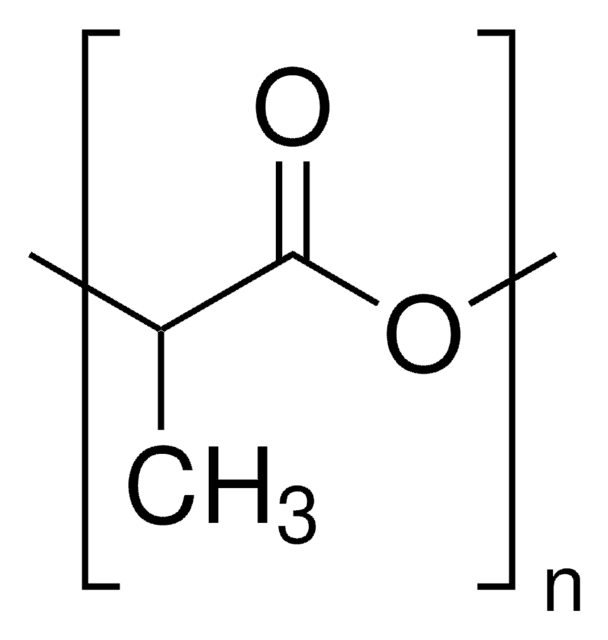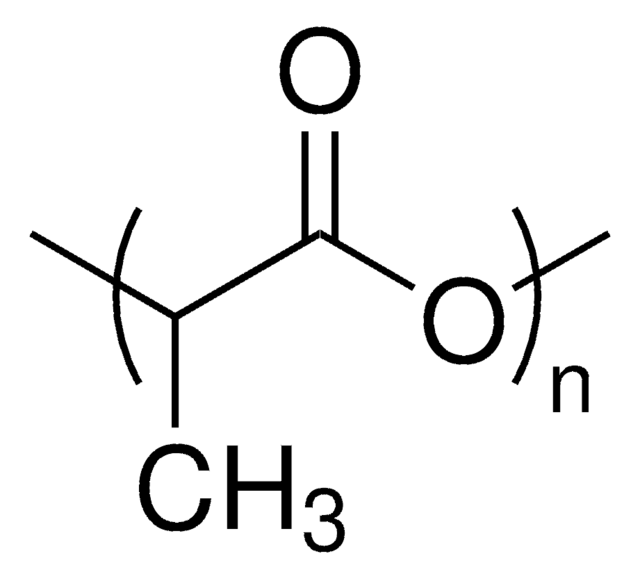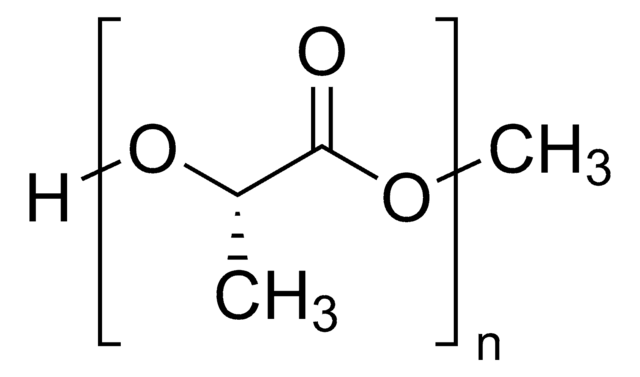67122
Poly(D-lactide)
inherent viscosity ~1.2 dl/g
Synonym(s):
D-Lactide polymer
Sign Into View Organizational & Contract Pricing
All Photos(1)
About This Item
CAS Number:
MDL number:
UNSPSC Code:
12352209
PubChem Substance ID:
NACRES:
NA.25
Recommended Products
Quality Level
mol wt
Mn ~90000
Mp ~95000
Mw ~124000
storage temp.
2-8°C
SMILES string
CC(O)C(O)=O
InChI key
JVTAAEKCZFNVCJ-UHFFFAOYSA-N
Application
Poly(D-lactide) (PDLA), a polymer of a stereospecific cyclic di-ester of lactic acid, is used in biomaterial research for the development of devices such as therapeutic drug delivery vessels. Poly(D-lactide) is used for the preparation of microparticles and resorbable polylactide scaffolds.
Storage Class Code
11 - Combustible Solids
WGK
WGK 3
Flash Point(F)
Not applicable
Flash Point(C)
Not applicable
Personal Protective Equipment
dust mask type N95 (US), Eyeshields, Gloves
Choose from one of the most recent versions:
Already Own This Product?
Find documentation for the products that you have recently purchased in the Document Library.
Customers Also Viewed
Jun Shao et al.
The journal of physical chemistry. B, 116(33), 9983-9991 (2012-08-02)
Stereocomplex poly(lactide)s (sc-PLAs) were obtained from solution blending of 3-armed poly(L-lactide) (3PLLA) and linear poly(D-lactide) (PDLA) and between enantiomeric 3PLAs. Differential scanning calorimetry and wide-angle X-ray diffraction results indicated that racemic crystallites were preferentially produced in all the binary blends.
J R Sarasua et al.
Journal of materials science. Materials in medicine, 22(11), 2513-2523 (2011-08-23)
Bioresorbable polylactides are one of the most important materials for tissue engineering applications. In this work we have prepared scaffolds based on the two optically pure stereoisomers: poly(L: -lactide) (PLLA) and poly(D: -lactide) (PDLA). The crystalline structure and morphology were
Jamal S Lewis et al.
Biomaterials, 33(29), 7221-7232 (2012-07-17)
Microparticulate systems for delivery of therapeutics to DCs for immunotherapy have gained attention recently. However, reports addressing the optimization of DC-targeting microparticle delivery systems are limited, particularly for cases where the goal is to deliver payload to DCs in a
Jingru Sun et al.
The journal of physical chemistry. B, 115(12), 2864-2869 (2011-03-10)
The effects of the addition of poly(D-lactide) (PDLA) on the crystallization behavior of poly(L-lactide)(PLLA) were investigated by means of differential scanning calorimetry (DSC) and temperature-dependent X-ray diffraction(XRD). When the blends were cooled from different temperatures (250, 240, and 190 °C)
Our team of scientists has experience in all areas of research including Life Science, Material Science, Chemical Synthesis, Chromatography, Analytical and many others.
Contact Technical Service







